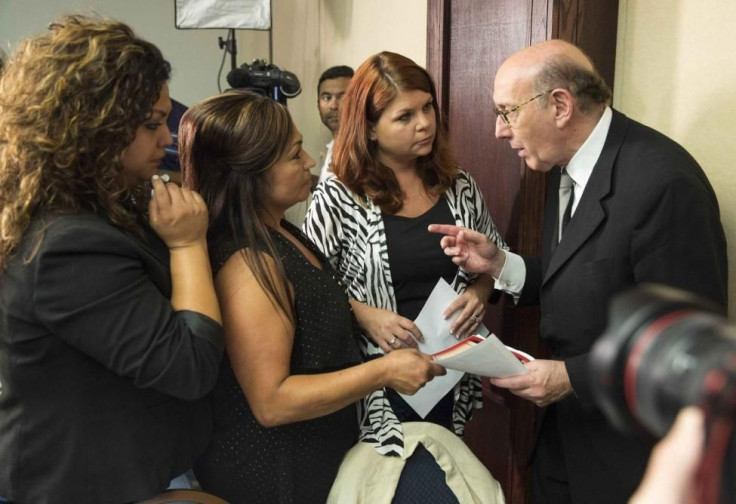GM Ignition Switch Recall: As Compensation Deadline Arrives, Families Say Air Bag Rule Excluded Them

General Motors will stop accepting claims after Saturday on its compensation fund for people killed by defective ignition switches in 2.6 million of its recalled cars. For many people who say GM is liable for the deaths of their loved ones, however, the deadline didn’t really matter because they weren’t eligible under GM’s compensation guidelines.
“My brother’s case was rejected by GM because the air bags deployed,” said Monica Coronado, the sister of Amador Cortinas, who was killed in Idaho Oct. 18, 2013. His 2005 Chevrolet Cobalt suddenly veered to the left, crossing the centerline and colliding head-on with another vehicle, KTVB-TV reported, citing local police.
The car Cortinas was driving was one of the vehicles GM began recalling early last year to fix an engineering flaw inside the ignition switch. A spring that is 1.6 millimeters too short causes the ignition key to sometimes accidentally slip out of the run position, shutting the car’s engine, power steering, power brakes and air bags. GM said it doesn’t accept liability for any accidents where the air bag deployed, because it indicates the car had power at the time of collision.
This tiny flaw killed at least 50 people and injured at least 75 others, according to GM’s latest count. Critics such as the Center for Auto Safety have argued the figures are much higher. They have pointed out that for years police wouldn’t have known to check the position of the ignition key in accidents involving the recalled vehicles, some dating as far back as the 2003 model year, because the public was not made aware of the problem until January 2014.
GM’s handling of the problem, known to engineers inside the company as far back as 2004, has led to federal and state inquiries in the U.S. and Canada, as well as a record-setting $35 million fine by the U.S. National Highway Traffic Safety Administration. The final cost of settling with victims and their families could reach $600 million, GM has said.
Coronado and others dismiss GM’s air-bag rule and are pursuing compensation through the courts. “That ignition switch shut off,” Coronado said of her brother’s accident. “And I think, like anyone would, he tried to turn the key to restart the engine.”
GM declined to comment on specifics Friday, but its compensation rulebook is pretty clear on the matter: A claim is rejected “if the facts and circumstances of the accident demonstrate the deployment of any airbag during the accident.”
Shannon Wooten said it felt like a “kick to the stomach” when she realized GM’s rules excluded her from seeking direct compensation from the automaker. “I didn’t know at first that [Kenneth R. Feinberg, administrator of GM’s ignition compensation claims resolution facility] was picking only certain claims,” said the resident of Robertson County, Tennessee. “I found out later that he only accepted the ones where the air bags didn’t deploy.”
Wooten’s son Joshua was killed in an accident in his mother’s 2006 Cobalt when he lost control, veered to the left and collided head-on with another vehicle. Like Coronado, Wooten said she thinks her son might have restarted the engine while he was trying to regain control of the vehicle during the accident. Wooten was one of several relatives of crash victims, including Coronado and her mother Rosie Cortinas, who traveled to Washington last June to meet with Feinberg when he announced the compensation program. At the time, he said he would pay “whatever it costs” to compensate victims.
Feinberg met with Coronado and other relatives of crash victims, but it turns out some of them were never going to be eligible for the GM compensation program. They’ll have to fight GM in court.
Robert Hilliard of the Hilliard Munoz Gonzales law firm in Corpus Christi, Texas, who represents more than 140 clients suing GM over the ignition-switch defect, said its compensation program has been problematic all along. “GM’s criteria is inconsistent and subjective,” he said in an email Friday. “Similar claims do not receive similar offers.”
A GM representative declined to offer details on the range and size of awards that have been granted so far, citing confidentiality. As of Jan. 23, the company had received more than 3,000 claims for compensation.
© Copyright IBTimes 2024. All rights reserved.












